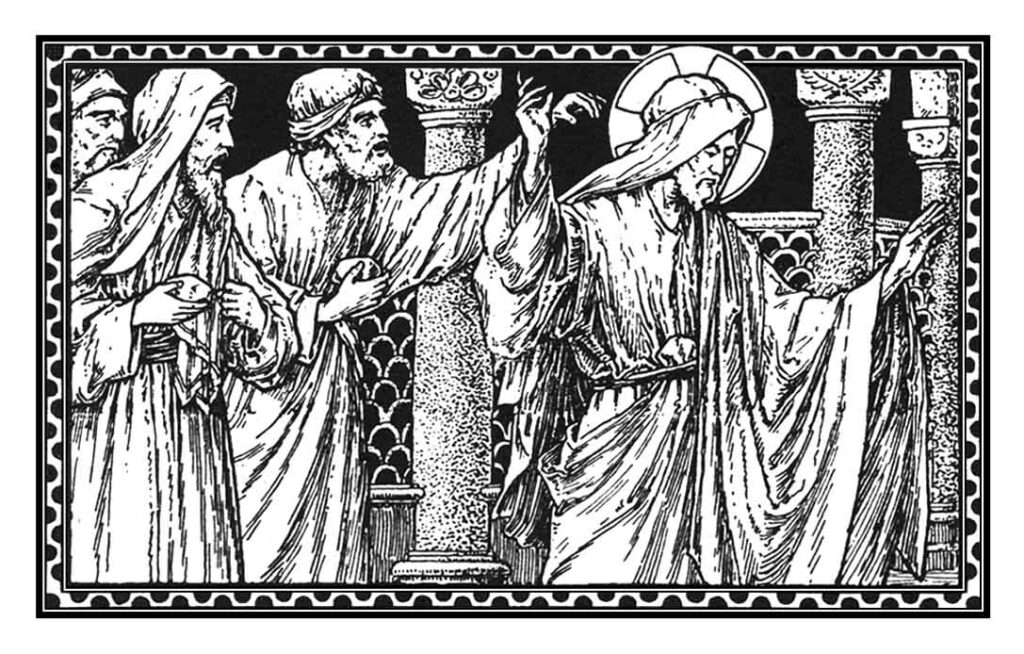Home l Liturgy & Sacraments l Liturgical Calendar
Passion Sunday – Sunday, March 17, 2024

The holy Church begins her night Office of this Sunday with these impressive words of the royal prophet, “Today if you shall hear the voice of the Lord, harden not your hearts”. Formerly, the faithful considered it their duty to assist at the night Office, at least on Sundays and feasts; they would have grieved to lose the grand teachings given by the liturgy. Such fervor has long since died out; the assiduity at the Offices of the Church, which was the joy of our Catholic forefathers, has now become a thing of the past; and even in countries which have not apostatized from the faith, the clergy have ceased to celebrate publicly Offices at which no one assisted. Excepting in cathedral churches and in monasteries, the grand harmonious system of the divine praise has been abandoned, and the marvellous power of the liturgy has no longer its full influence upon the faithful.
This is our reason for drawing the attention of our readers to certain beauties of the Divine Office, which would otherwise be totally ignored. Thus, what can be more impressive than this solemn Invitatory of to-day’s Matins, which the Church takes from one of the psalms, and which she repeats on every feria between this and Maundy Thursday? She says; To-day, if ye will hear the voice of the Lord, harden not your hearts! The sweet voice of your suffering Jesus now speaks to you, poor sinners! be not your own enemies by indifference and hardness of heart. The Son of God is about to give you the last and greatest proof of the love that brought Him down from heaven; His death is nigh at hand: men are preparing the wood for the immolation of the new Isaac: enter into yourselves, and let not your hearts, after being touched with grace, return to their former obduracy; for nothing could be more dangerous. The great anniversaries we are to celebrate have a renovating power for those souls that faithfully correspond with the grace which is offered them; but they increase insensibility in those who let them pass without working their conversion. To-day, therefore, if you hear the voice of the Lord, harden not your hearts!
During the preceding four weeks, we have noticed how the malice of Jesus’ enemies has been gradually increasing. His very presence irritates them; and it is evident that any little circumstance will suffice to bring the deep and long-nurtured hatred to a head. The kind and gentle manners of Jesus are drawing to Him all hearts that are simple and upright; at the same time, the humble life He leads, and the stern purity of His doctrines, are perpetual sources of vexation and anger, both to the proud Jew that looks forward to the Messias being a mighty conqueror, and to the pharisee, who corrupts the Law of God, that he may make it the instrument of his own base passions. Still, Jesus goes on working miracles; His discourses are more than ever energetic; His prophecies foretell the fall of Jerusalem, and such a destruction of its famous temple, that not a stone is to be left on a stone. The doctors of the Law should, at least, reflect upon what they hear; they should examine these wonderful works, which render such strong testimony in favour of the Son of David; and they should consult these divine prophecies which, up to the present time, have been so literally fulfilled in His person. Alas! they themselves are about to carry them out to the very last iota. There is not a single outrage or suffering foretold by David and Isaias, as having to be put upon the Messias, which these blind men are not scheming to verify.
In them, therefore, was fulfilled that terrible saying: ‘He that shall speak against the Holy Ghost, it shall not be forgiven him, neither in this world, nor in the world to come.’ [St. Matthew 12: 32.] The Synagogue is nigh to a curse. Obstinate in her error, she refuses to see or to hear; she has deliberately perverted her judgment: she has extinguished within herself the light of the holy Spirit; she will go deeper and deeper into evil, and at length fall into the abyss. This same lamentable conduct is but too often witnessed nowadays in those sinners, who, by habitual resistance to the light, end by finding their happiness in sin. Neither should it surprise us, that we find in people of our own generation a resemblance to the murderers of our Jesus: the history of His Passion will reveal to us many sad secrets of the human heart and its perverse inclinations; for what happened in Jerusalem, happens also in every sinner’s heart. His heart, according to the saying of St. Paul, is a Calvary, where Jesus is crucified. There is the same ingratitude, the same blindness, the same wild madness, with this difference: that the sinner who is enlightened by faith, knows Him whom he crucifies; whereas the Jews, as the same apostle tells us, knew not the Lord of glory [1 Corinthians 2: 8.] Whilst, therefore, we listen to the Gospel, which relates the history of the Passion, let us turn the indignation which we feel for the Jews against ourselves and our own sins; let us weep over the sufferings of our Victim, for our sins caused Him to suffer and die.
Everything around us urges us to mourn. The images of the saints, the very crucifix on our altar, are veiled from our sight. The Church is oppressed with grief. During the first four weeks of Lent, she compassionated her Jesus fasting in the desert; His coming sufferings and crucifixion and death are what now fill her with anguish. We read in to-day’s Gospel, that the Jews threaten to stone the Son of God as a blasphemer: but His hour is not yet come. He is obliged to flee and hide Himself. It is to express this deep humiliation, that the Church veils the cross. A God hiding Himself, that He may evade the anger of men – what a mystery! Is it weakness? Is it, that He fears death? No; we shall soon see Him going out to meet His enemies: but at present He hides Himself from them, because all that had been prophesied regarding Him has not been fulfilled. Besides, His death is not to be by stoning: He is to die upon a cross, the tree of malediction, which, from that time forward, is to be the tree of life. Let us humble ourselves, as we see the Creator of heaven and earth thus obliged to hide Himself from men, who are bent on His destruction! Let us go back, in thought, to the sad day of the first sin, when Adam and Eve bid themselves because a guilty conscience told them they were naked. Jesus has come to assure us of our being pardoned, and lo! He hides Himself, not because He is naked – He that is to the saints the garb of holiness and immortality – but because He made Himself weak, that He might make us strong. Our first parents sought to hide themselves from the sight of God; Jesus hides Himself from the eye of men. But it will not be thus for ever. The day will come when sinners, from whose anger He now flees, will pray to the mountains to fall on them and shield them from His gaze; but their prayer will not be granted, and they shall see the Son of Man coming in the clouds of heaven, with much power and majesty [St. Matt. xxiv. 30].
This Sunday is called Passion Sunday, because the Church begins, on this day, to make the sufferings of our Redeemer her chief thought. It is called also, Judica, from the first word of the Introit of the Mass; and again Neomania, that is, the Sunday of the new (or the Easter) moon, because it always falls after the new moon which regulates the feast of Easter.
Dom Prosper Gueranger, The Liturgical Year
Copyright © 2015-2025 Saint Joseph Catholic Church, Latin Mass Parish, 602 S 34th St., Tacoma, WA 98418. All Rights Reserved.
Website comments or questions: info@saintjosephtacoma.org


